| VFW Connections |
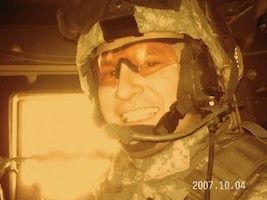 |
Mike is a brand-new member of Post 1503! (Our interview was the first time he had visited the Canteen.) He loved hearing about our active organization and looks forward to learning more about all we have to offer. Be sure to say hello if you see him at the post.
Mike was interested in joining the VFW, as he was looking for a community of fellow veterans after his retirement from the Army. Mike hopes to participate in the many events Post 1503 has to offer. He also wants to support the needs of veterans and their families by representing the veteran community to governmental entities.
|
Mike was born in Fontana, California. It was an industrial, somewhat rural town at the entrance to the desert known for its steel mill, railroads, and cargo industry. His father was a machinist at the steel mill and later commuted to work at a nuclear plant in San Onofre. His mother was employed by Kaiser and was responsible for clerical work for the medical industry. Mike and his younger sister grew up surrounded by nature, especially the San Bernardino Mountains and the local beaches. Starting at his Catholic elementary school, Mike enjoyed reading, especially fantasy and horror books. His favorite classes were his English and history courses. He was also passionate about playing sports, especially baseball and soccer. Although Mike’s parents separated when he was 10, his father continued to coach him in several sports and took him on skiing trips.
He describes his high school experience as being "awesome,” as he made friends while commuting to his high school in San Bernardino and continuing his involvement in sports. By the time he was a senior, he was an All-League four-sport athlete for soccer, baseball, football, and track. Mike graduated in a small class of only 66 students.
Although he wasn’t entirely sure what he wanted to pursue professionally after high school, Mike attended the University of Redlands, a private California institution with a beautiful campus. With excellent professors, Mike majored in philosophy and minored in sociology, even spending some time in a semester study-abroad program in Austria. He continued to play football, baseball, and soccer for some time. As the university was just down the street from where he grew up, Mike also spent time coaching soccer at his old school for four years, leading them to four league wins and one Division win. After graduating with his bachelor’s in 1999, Mike went to work stocking products for 7UP/RC Cola, as his uncle worked for a large grocery chain.
Looking to expand his professional opportunities, Mike reached out to the Air Force and Marine Corps to inquire about officer training, but ultimately decided to pursue an enlistment in the Army. He completed his basic training at Fort Jackson in South Carolina, also known to recruits as Camp Snoopy. As he arrived during the winter, many of his field exercises took place in the snow over the nine weeks of training. 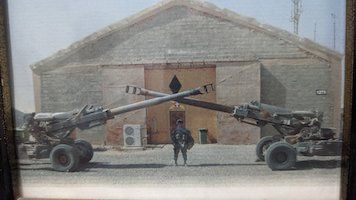
From there, he was sent to Fort Huachuca in Arizona. He spent six months at the MOS school in rigorous training for the Army Counterintelligence Program. He loved the challenges throughout the comprehensive investigative training. Mike recalls, "It was very highly technical types of stuff. It kind of had an art and a science to it. The art was getting people to tell you things or admit things. And then the science was getting it all documented right.” They also completed analytic training, focusing on tracking movements of individuals and other counterintelligence operations.
It was also during this time he proposed to his then-girlfriend, Kristine, his high school sweetheart. He arranged for some leave so they could marry while he was in AIT prior to his PCS to Belgium. Once in Belgium, Mike worked at the resident office at the NATO military headquarters, SHAPE, helped with background investigations for clearances, and collaborated with local authorities. He remained there for three years and enjoyed his time with this tight-knit unit from 2000-2003.
At the end of his time in Belgium, Mike had orders to go to Fort Lewis. However, he discovered his Green to Gold packet was unexpectedly approved after several attempts at unsuccessfully applying for Army Officer Candidate School. He signed up for a two-year master’s program at Arizona State in Tempe and was part of a ROTC reserve detachment while he studied. During the two summers of this program, he spent several months TDY in Okinawa. He graduated in 2006 an MS in Injustice Studies and was promoted to Lieutenant.
Once his graduate program was complete, Mike was assigned to Officer Chemical Training in Fort Leonard Wood, Missouri, for six months. This intense course of study focused on nuclear, biological, and chemical defense knowledge, requiring several rigorous testing points throughout the training.
At the height of the Iraq War, Mike received orders to Fort Lewis, Washington, and was originally told his unit would be deploying in a month, as he was supposed to go to a Military Intelligence (MI) Brigade as a Chemical Officer. However, he ended up being assigned to the 4th Brigade, 2nd Infantry Division Stryker Brigade Combat Team, which was set to deploy in nine months. Prior to the deployment, the brigade engaged in relentless training to prepare, often without meals, sleep, or breaks. The brigade was constantly out in the field with live fire exercises and night vision training.
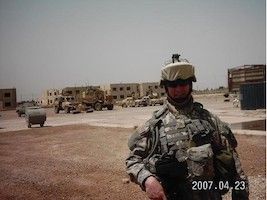
In August of 2007, they headed to Taji, Iraq. The pace of work was hectic and Mike found himself in challenging conditions as part of the "Surge.” Food was limited and one night their tent blew away from the high winds, leaving their personal possessions scattered. Mike trained as an Intelligence Officer and then worked in S3 as the night Battle Captain in Headquarters for the deployment. The brigade remained deployed for an exhausting 14 months.
Upon his return from Iraq, Mike headed to Fort Huachuca for six months to complete the Military Intelligence Career Course. Then just six weeks after his baby daughter was born, Mike and his family packed up for a PCS to Camp Humphreys, a small base in Pyeongtaek, South Korea. They spent two years there and Mike worked as the Captain for the Aviation Battalion S2.
From there, the family headed to Fort Sam Houston, Texas. Mike was part of the MI Command and the battalion prepared to deploy the following year. Just four months after Mike and Kristine welcomed a son, Mike headed to Bagram Air Force Base in October of 2012 as Commander of an interrogation company. He spent six months of his command in Afghanistan and then became the assistant S3 as the senior Captain in the command.
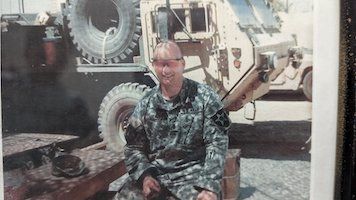
When the 11-month deployment was complete, Mike was selected for the National Intelligence University and headed to Washington, DC. After continuing his training at Bolling Air Base, he was promoted to Major. He spent eight months in the Army’s Intelligence and Security Command (INSCOM) coordinating big training events. During this time, he decided he would switch his branch, moving from tactical MI to strategic MI.
In 2016, he received orders to Miami to work with the US Southern Command for a three-year rotation. Mike served as the Deputy of the Geospatial-Intelligence Division, even deploying the use of imagery to coordinate support for post-hurricane events. He then worked with the Counter-Threat Networks Division and collaborated with the FBI in Miami as part of the Joint Terrorism Task Force.
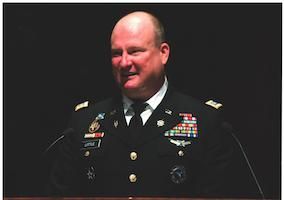
His final duty station was the National Geospatial-Intelligence Agency in Springfield, Virginia. Mike’s work focused on the impact of artificial intelligence (AI) in supporting innovations in intelligence. After 21 years of active duty and reserve service, Mike retired from the US Army in October of 2021.
After retiring, Mike and his wife decided to settle in the area to provide stability for their children. He is currently working as a contractor and his wife spent some time teaching in Prince William County. Mike is looking forward to his post-military life and hopes to support the VFW, especially when it comes to representing veterans in governmental programs.
- In addition to playing football, Mike loved watching the sport on TV. Just a day after viewing one of the Air Force Academy games, he received a call by their coach to recruit him for their football team. However, he wasn’t sure if the military was the best choice for him at the time, so he declined their offer.
- Mike’s job working for 7UP/RC was physically demanding and his shift was from 4AM-6PM. He figured the military might provide him with more opportunities for his future.
- Although Mike thought his recruiter was helping him secure an Army enlistment for a Criminal Investigation Division (CID) position, he was trained for the Army Counterintelligence (CI) Program instead.
- Mike says his decision to pursue an enlistment instead of officer training provided him with the "experience” he wanted to start his military career.
- As Mike prepared for his first duty station in Belgium, he submitted paperwork for his brand-new wife, Kristine, to join him. However, her command sponsorship was delayed and she had to wait three weeks to be able to join him.
- During his master’s program, Mike studied the concept of the ethical dilemma (i.e. is it better to do X or Y in conditions of Z) in relation to the Code of Conduct. He interviewed individuals from his Army Reserve unit using real historical examples from the Vietnam and Korean wars. Ultimately, his research based on this sample population concluded that the higher an individual’s rank, the greater one’s feelings toward individual discretion when it comes to obeying commands and following rules.
- Despite Mike submitting his master’s project on time, the chair of his thesis committee wanted to see more editing and assigned him an incomplete at the scheduled end of his program. After making the requested changes to his research project, he had to fly back from Missouri to defend his thesis, which he did successfully.
